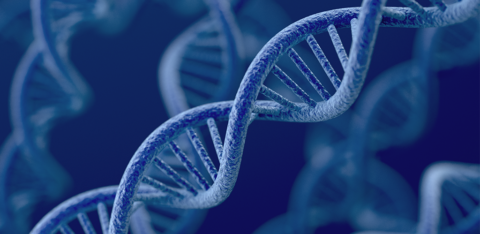The role of genes in MS
Exploring the link between genetics and the risk of developing MS.
Last updated: 1st September 2021

The genetics of MS has been a focus of research for many years, generating many insights into the causes of MS and the underlying biology of MS. People are often also concerned about the way MS occurs in families and the potential risk of other family members developing MS.
What is genetics?
Put simply, genetics is the study of genes. Genes are the units of information found within almost every cell in the body. They are the instructions, or blueprint, inherited from our parents that contain all the instructions required to build our bodies and help them function. Specifically, genes are the instructions to make proteins, which are the building blocks of the body. Genes are made of a chemical called deoxyribonucleic acid, better known as DNA. Genes influence many of our characteristics including the likelihood of developing disease.
The complete set of genes is called the genome and the human genome contains around 20,000 genes. Every person has two copies of each gene, one inherited from their mother and one inherited from their father. The code of each gene copy inherited from your parents can be the same or it can be slightly different. Changes to the genetic code are known as polymorphisms or mutations, mutations often refer to genetic changes that lead directly to disease. For some diseases, a single tiny change to a single gene can result in the person getting a disease. In other diseases, such as MS, the relationship with genes is more complex and researchers need to look at many changes in the genetic code across the genome to determine if there are any patterns.
Genetics and the risk of developing MS
MS is not, strictly speaking, a genetic disorder. True genetic disorders can be inherited in a specific and predictable way from parent to child. However, if you have MS, it is by no means definite that your children will develop MS. Often, there is no family history of MS, and only one person in a family may have it.
Genes do play a role in the risk of developing MS, but they are not the whole story. Both genes and other factors, such as environmental exposures, must combine to lead to the development of MS.
At present, over 200 subtle genetic changes have been linked to the risk of developing MS and this, in turn, has provided evidence about the mechanisms of MS. The gene with the strongest link to the risk of MS is called HLA-DRB15*01 and this is a major gene of the immune system. This gene is also more commonly found in people of northern European ancestry, which also partially explains why these populations are more likely to develop MS than people from other ethnic backgrounds. Many of the other more minor risk genes are also known to play a role in regulating the immune system. This makes sense, since it is known that MS occurs when the immune system mistakenly attacks the brain and spinal cord.
Risk in relatives of people with MS
It has been estimated that genetics accounts for just over half of the risk of developing MS, and those with a family history of MS are at more risk than the general population.
In an Australian study conducted in 2013, the researchers combined data from a number of previous international studies to determine the risk of MS in family members of people with MS. In this study, the overall risk of MS was calculated to be 1 in 625 for the general population worldwide – indicating that one person in every 625 is at risk of developing MS (or 0.16%). This is the average risk worldwide; the precise number varies depending on where you live and your ethnicity.
The researchers found that the risk of developing MS varies according to how closely related a person is to someone with MS. For example, in identical twins who share all of their genetic make-up, the risk of MS in the second twin over their lifetime is 1 in 6 (or 18.2%). By comparison, a sibling of a person with MS has a 1 in 37 (2.7%) chance of developing MS, whilst non-identical twins (who have the same proportion of genes in common as siblings) have a lifetime risk of 1 in 22 (4.6%). This increase for non-identical twins compared to ordinary siblings is likely due to the very closely shared environmental factors experienced by non-identical twins.
Parents and children also share half of their genes. The study above also showed that parents of people with MS have a 1 in 67 (1.5%) likelihood of getting MS and children of people with MS have a rate of 1 in 48 (2.1%) over their lifetimes. Relatives that are genetically more distant show lower risk levels of developing MS. The lifetime risk of aunts and uncles was shown to be 1 in 125 (0.8%), nieces and nephews 1 in 100 (1%) and cousins 1 in 142 (0.7%).
What about genetic testing for MS?
Whilst genes do play a role in MS, an individual’s risk of developing MS is influenced not just by one or two genes, but by a combination of all of their genes and the environmental factors that they have been exposed to over their lifetime. As such, a simple genetic test would not be able to accurately predict if a person will go on to develop MS and is not currently offered as part of routine care to relatives of people with MS.
Click here to read the original article.
With thanks to MS Research Australia – the lead provider of research articles on our website.